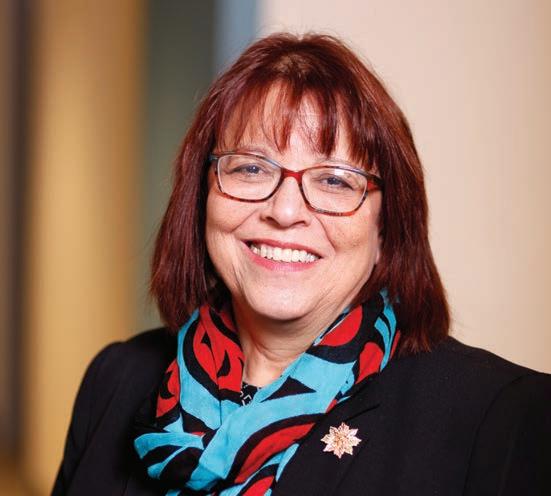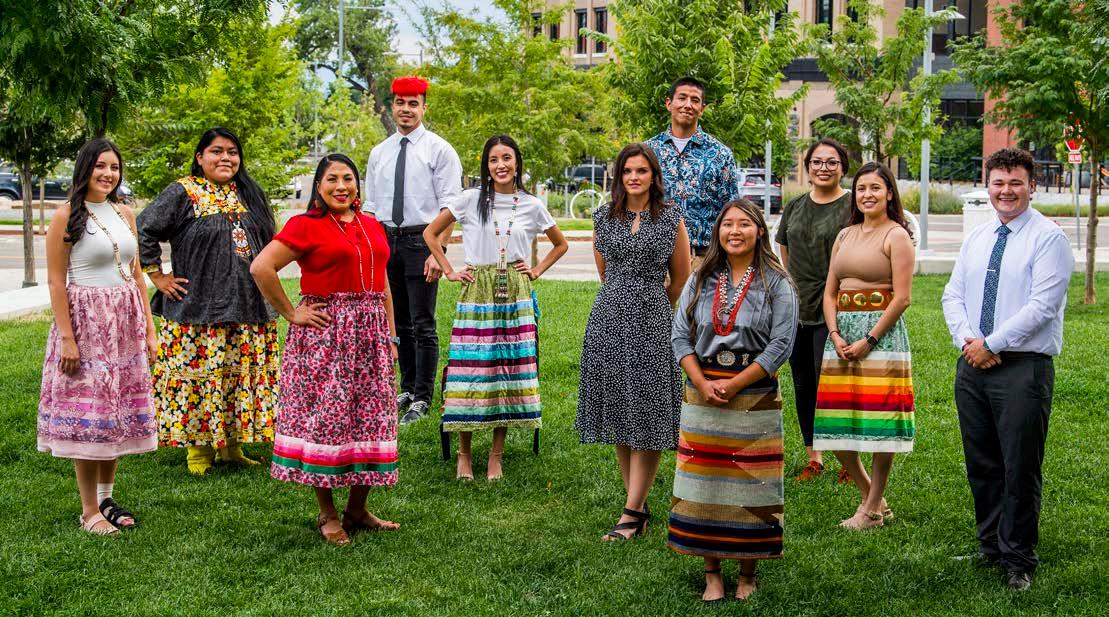
5 minute read
Message from the President
How Your Donations Are Used: Fulfilling Our Mission
Our Commitment to You:
For 33 years, the American Indian College Fund has been committed to transparency and accountability while serving our students, tribal colleges, universities, and communities. We consistently receive top ratings from independent charity evaluators. • We earned the Best in America Seal of Excellence from the Independent Charities of America. Of the one million charities operating in the United States, fewer than 2,000 organizations have been awarded this seal.
• The College Fund meets the Standards for Charity Accountability of the Better Business Bureau’s Wise Giving Alliance. • The College Fund received a Gold Seal of Transparency from Guidestar. • The College Fund consistently receives high ratings from Charity Navigator. For more ratings and information, please visit https://collegefund.org/about-us/
74%
Expenditures that are Scholarships, Programs, and Public Education
22%
Expenditures that are Fundraising
4%
Expenditures that are General Administration
Message from the President

Amove towards national acknowledgment and equity for Native people has been underway these past few years, putting Indian Country in the headlines more than ever. This is long overdue. For more than 500 years Native people have been ignored, rewritten, or deleted entirely from history. Stories about tuition waivers for Native students attending state higher education institutions; the implications of undercounting Native people in the U.S. Census; rectifying reporting procedures for murdered and missing Indigenous people; the U.S. Department of Interior’s investigation into Native children’s deaths in Indian boarding schools; and the political question about tribal sovereignty in Indian Country were in the headlines. What does the term Indian Country mean? And why is it so important? Simply put, Indian Country is both the land that is the United States (and indeed, all of the Americas). Indian Country is also a legal term describing tribal lands held in trust by the federal government for Native people who were and still are here.
Indian Tribes, bands, or other organized groups or communities, as well as Alaska Native villages, asserted their status as sovereign nations by negotiating treaties to exchange land with the federal government to access funding, goods, and services, and the education of our children. What we did not cede was our identities as sovereign Indigenous Nations: the right to uphold our beliefs, our traditions, our languages, our cultural practices, our connection to the land, and even the right to raise our children in our communities. Although the history of treaty-making is fraught with duress, manipulation, and lies (running counter to the notion of good faith and fairness implicit in legal contracts), the treaties we signed as sovereign Nations with the federal government established trust relationships between the U.S. and Tribes. The Bureau of Indian Affairs, situated in the U.S. Department of Interior, upholds this trust relationship. Tribal Nations remain sovereign to this day. It may be helpful to think of Tribal Nations in the United States as similar to member European countries in the European Union (E.U.). Citizens of Germany are subject to German laws and to the laws of the E.U., just as Tribal citizens are subject to Tribal laws and the laws of the United States. Each Tribal Nation has its own elected leaders, governments, and systems that continue to uphold tribal self-determination and self-governance. Since the days of treaty-making, there have been deliberate attempts through federal legislation, policies, and social practices—such as boarding schools and child removal through the welfare system—that focused on breaking up the traditional, familial, and spiritual practices that are the foundation of our Tribal identities. The goal was assimilation and removal of Native peoples to take to our land. These efforts thankfully failed, but today they are underway again. The U.S. Supreme Court has already curtailed our status as sovereign nations this year in a case allowing states to prosecute non-tribal members committing crimes on sovereign Indian lands, and a pending case concerning tribal rights over its tribal members in adoption cases has Indigenous people deeply concerned about the future of sovereignty. TCUs foster tribal identities and ways of living that reflect tribal selfdetermination. These institutions of higher learning are instruments of tribal sovereignty, having been chartered by Native Nations, and are a great source of healing and hope for more prosperous and healthier individuals and families in our communities. Since the establishment of tribal colleges and universities began during the Civil Rights Era, TCUs have reflected the values of the American Indian and Alaska Nations they serve. These remarkable institutions work to revitalize Indigenous languages, family systems, land, and natural resources—all important and fundamental to Native Nations’ sovereign status. Now more than ever, your support—as allies, contributors, and advocates—is so important to our students, our TCUs, and our communities. We invite you to continue with us as we work to elevate the visibility of our histories, contributions, and existence as sovereign Nations. Together, we can ensure a life of abundant opportunities for ourselves and for future generations of Indigenous people, while adding to the richness of this country—which is Indian Country.
Cheryl Crazy Bull President and CEO, American Indian College Fund

Our Impact Since 1989
Total number of scholarships awarded since 1989: 153,890
Total number of students served since 1989: 128,700
Total dollar amount of scholarships awarded since 1989: $148,528,000
Total dollar amount of direct student support other than scholarships awarded since 1989: $9,974,000

Total dollar amount of all student support provided since 1989: $158,502,000
Total dollar amount of all student support awarded in 2021-22: $14,045,000
Our Impact 2021-22
The American Indian College Fund has 258 unique scholarship programs
Total number of students served in 2021-22: 3,213
Total dollar amount of scholarships awarded in 2021-22: $13,125,000
Total dollar amount of direct student support other than scholarships awarded in 2021-22: $920,000
Number of first-generation scholars served in 2021-22: 1,892 or 58.9% of students
Top Five Majors of Our Scholars
Business Administration Liberal Arts General Studies Early Childhood Education American Indian/Native American Studies


